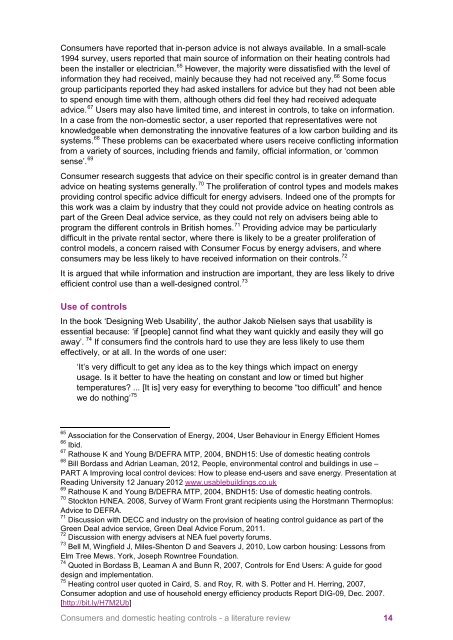Consumers-and-domestic-heating-controls-a-literature-review
Consumers-and-domestic-heating-controls-a-literature-review
Consumers-and-domestic-heating-controls-a-literature-review
Create successful ePaper yourself
Turn your PDF publications into a flip-book with our unique Google optimized e-Paper software.
<strong>Consumers</strong> have reported that in-person advice is not always available. In a small-scale<br />
1994 survey, users reported that main source of information on their <strong>heating</strong> <strong>controls</strong> had<br />
been the installer or electrician. 65 However, the majority were dissatisfied with the level of<br />
information they had received, mainly because they had not received any. 66 Some focus<br />
group participants reported they had asked installers for advice but they had not been able<br />
to spend enough time with them, although others did feel they had received adequate<br />
advice. 67 Users may also have limited time, <strong>and</strong> interest in <strong>controls</strong>, to take on information.<br />
In a case from the non-<strong>domestic</strong> sector, a user reported that representatives were not<br />
knowledgeable when demonstrating the innovative features of a low carbon building <strong>and</strong> its<br />
systems. 68 These problems can be exacerbated where users receive conflicting information<br />
from a variety of sources, including friends <strong>and</strong> family, official information, or ‘common<br />
sense’. 69<br />
Consumer research suggests that advice on their specific control is in greater dem<strong>and</strong> than<br />
70<br />
advice on <strong>heating</strong> systems generally. The proliferation of control types <strong>and</strong> models makes<br />
providing control specific advice difficult for energy advisers. Indeed one of the prompts for<br />
this work was a claim by industry that they could not provide advice on <strong>heating</strong> <strong>controls</strong> as<br />
part of the Green Deal advice service, as they could not rely on advisers being able to<br />
program the different <strong>controls</strong> in British homes. 71 Providing advice may be particularly<br />
difficult in the private rental sector, where there is likely to be a greater proliferation of<br />
control models, a concern raised with Consumer Focus by energy advisers, <strong>and</strong> where<br />
consumers may be less likely to have received information on their <strong>controls</strong>. 72<br />
It is argued that while information <strong>and</strong> instruction are important, they are less likely to drive<br />
73<br />
efficient control use than a well-designed control.<br />
Use of <strong>controls</strong><br />
In the book ‘Designing Web Usability’, the author Jakob Nielsen says that usability is<br />
essential because: ‘if [people] cannot find what they want quickly <strong>and</strong> easily they will go<br />
away’. 74<br />
If consumers find the <strong>controls</strong> hard to use they are less likely to use them<br />
effectively, or at all. In the words of one user:<br />
‘It’s very difficult to get any idea as to the key things which impact on energy<br />
usage. Is it better to have the <strong>heating</strong> on constant <strong>and</strong> low or timed but higher<br />
temperatures? ... [It is] very easy for everything to become “too difficult” <strong>and</strong> hence<br />
75<br />
we do nothing’<br />
65<br />
Association for the Conservation of Energy, 2004, User Behaviour in Energy Efficient Homes<br />
66<br />
Ibid.<br />
67<br />
Rathouse K <strong>and</strong> Young B/DEFRA MTP, 2004, BNDH15: Use of <strong>domestic</strong> <strong>heating</strong> <strong>controls</strong><br />
68<br />
Bill Bordass <strong>and</strong> Adrian Leaman, 2012, People, environmental control <strong>and</strong> buildings in use –<br />
PART A Improving local control devices: How to please end-users <strong>and</strong> save energy. Presentation at<br />
Reading University 12 January 2012 www.usablebuildings.co.uk<br />
69<br />
Rathouse K <strong>and</strong> Young B/DEFRA MTP, 2004, BNDH15: Use of <strong>domestic</strong> <strong>heating</strong> <strong>controls</strong>.<br />
70<br />
Stockton H/NEA. 2008, Survey of Warm Front grant recipients using the Horstmann Thermoplus:<br />
Advice to DEFRA.<br />
71<br />
Discussion with DECC <strong>and</strong> industry on the provision of <strong>heating</strong> control guidance as part of the<br />
Green Deal advice service, Green Deal Advice Forum, 2011.<br />
72<br />
Discussion with energy advisers at NEA fuel poverty forums.<br />
73<br />
Bell M, Wingfield J, Miles-Shenton D <strong>and</strong> Seavers J, 2010, Low carbon housing: Lessons from<br />
Elm Tree Mews. York, Joseph Rowntree Foundation.<br />
74<br />
Quoted in Bordass B, Leaman A <strong>and</strong> Bunn R, 2007, Controls for End Users: A guide for good<br />
design <strong>and</strong> implementation.<br />
75<br />
Heating control user quoted in Caird, S. <strong>and</strong> Roy, R. with S. Potter <strong>and</strong> H. Herring, 2007,<br />
Consumer adoption <strong>and</strong> use of household energy efficiency products Report DIG-09, Dec. 2007.<br />
[http://bit.ly/H7M2Ub]<br />
<strong>Consumers</strong> <strong>and</strong> <strong>domestic</strong> <strong>heating</strong> <strong>controls</strong> - a <strong>literature</strong> <strong>review</strong> 14


